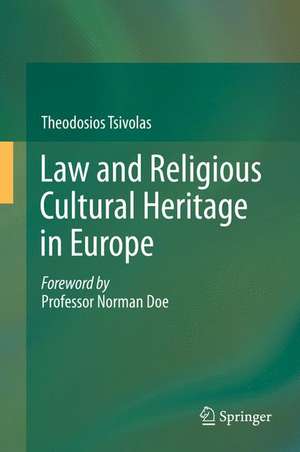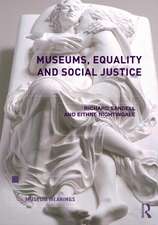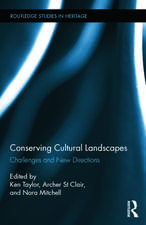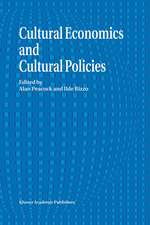Law and Religious Cultural Heritage in Europe
Autor Theodosios Tsivolas Cuvânt înainte de Norman Doeen Limba Engleză Hardback – 4 aug 2014
Furthermore, the book analyzes all relevant international legislative instruments (i.e. the plethora of EU, EC and UNESCO norms), as well as all major European legislative patterns, in light of their significance for the aforementioned aspects of pluralism and neutrality. The interdisciplinary references listed at the end of each chapter provide an additional incentive for further reading on the subject matter.
The most important finding to emerge from the study is that there is a shared legal ethos in Europe that imposes a duty of appropriate care concerning the vast variety of sacred cultural goods and the religious cultural heritage in general, as an invaluable repository of European cultural capital. It also considers the sui generis nature of this capital: like any other type of asset, it may deteriorate or fade over time, necessitating investment in its preservation or refurbishment; nevertheless, like no other, this particular capital maintains a distinct cultural value, as it contains an additional characteristic of ‘sacredness’ expressed in the form of its ‘religious character,’ the latter being analyzed as a triptych of religious memory, religious aesthetics and religious beliefs.
| Toate formatele și edițiile | Preț | Express |
|---|---|---|
| Paperback (1) | 552.13 lei 38-44 zile | |
| Springer International Publishing – 23 aug 2016 | 552.13 lei 38-44 zile | |
| Hardback (1) | 641.71 lei 6-8 săpt. | |
| Springer International Publishing – 4 aug 2014 | 641.71 lei 6-8 săpt. |
Preț: 641.71 lei
Preț vechi: 754.95 lei
-15% Nou
Puncte Express: 963
Preț estimativ în valută:
122.81€ • 127.74$ • 101.38£
122.81€ • 127.74$ • 101.38£
Carte tipărită la comandă
Livrare economică 14-28 aprilie
Preluare comenzi: 021 569.72.76
Specificații
ISBN-13: 9783319079318
ISBN-10: 331907931X
Pagini: 230
Ilustrații: XII, 183 p. 3 illus., 1 illus. in color.
Dimensiuni: 155 x 235 x 17 mm
Greutate: 0.45 kg
Ediția:2014
Editura: Springer International Publishing
Colecția Springer
Locul publicării:Cham, Switzerland
ISBN-10: 331907931X
Pagini: 230
Ilustrații: XII, 183 p. 3 illus., 1 illus. in color.
Dimensiuni: 155 x 235 x 17 mm
Greutate: 0.45 kg
Ediția:2014
Editura: Springer International Publishing
Colecția Springer
Locul publicării:Cham, Switzerland
Public țintă
ResearchCuprins
1. Introduction.- 2. Historical Background.- 3. Current Developments and Political Trends.- 4. Defining Religious Cultural Heritage in Europe.- 5. Typology of Protected Elements.- 6. Criteria of Protection.- 7. The Status of Res Mixtae.- 8. European and International Legislation.- 9. Select National Legislations.- 10. Conclusion.
Recenzii
“This book adds to Tsivolas’s scholarly credentialsand is a clearly written study of comparative law that examines the nationallegislation of twelve European countries. It is a welcome and valuablecontribution that offers a fascinating dialogue among law, culture andreligion, and consequently, the book will be of great interest to all academicsand students working in the area of the typology of church–state relations inEurope and who explore the intersections of law, religion, and culture.” (GeorgeAndroutsopoulos, Journal of Church and State, Vol. 57 (4), 2015)
Textul de pe ultima copertă
This book examines in detail both historical and current legal concepts of ‘religious cultural heritage’ within the context of the European continent. The latter group is primarily based on the variety of sacred cultural elements emanating from the different religious traditions of the peoples of Europe, which are deemed worthy of protection and preservation due to their outstanding value, in terms of their social, cultural and religious significance. In view of this, the study provides evidence of the European States’ active involvement with their sacred/cultural treasures, on the basis of the political and legal foundations of neutrality and pluralism.
Furthermore, the book analyzes all relevant international legislative instruments (i.e. the plethora of EU, CoE and UNESCO norms), as well as all major European legislative patterns, in light of their significance for the aforementioned aspects of pluralism and neutrality. The interdisciplinary references listed at theend of each chapter provide an additional incentive for further reading on the subject matter.
The most important finding to emerge from the study is that there is a shared legal ethos in Europe that imposes a duty of appropriate care concerning the vast variety of sacred cultural goods, and the religious cultural heritage in general, as an invaluable repository of European cultural capital. It also considers the sui generis nature of this capital: like any other type of asset, it may deteriorate or fade over time, necessitating investment in its preservation or refurbishment; nevertheless, like no other, this particular capital maintains a distinct cultural value, as it contains an additional characteristic of ‘sacredness’ expressed in the form of its ‘religious character,’ the latter being analyzed as a triptych of religious memory, religious aesthetics and religious beliefs.
Furthermore, the book analyzes all relevant international legislative instruments (i.e. the plethora of EU, CoE and UNESCO norms), as well as all major European legislative patterns, in light of their significance for the aforementioned aspects of pluralism and neutrality. The interdisciplinary references listed at theend of each chapter provide an additional incentive for further reading on the subject matter.
The most important finding to emerge from the study is that there is a shared legal ethos in Europe that imposes a duty of appropriate care concerning the vast variety of sacred cultural goods, and the religious cultural heritage in general, as an invaluable repository of European cultural capital. It also considers the sui generis nature of this capital: like any other type of asset, it may deteriorate or fade over time, necessitating investment in its preservation or refurbishment; nevertheless, like no other, this particular capital maintains a distinct cultural value, as it contains an additional characteristic of ‘sacredness’ expressed in the form of its ‘religious character,’ the latter being analyzed as a triptych of religious memory, religious aesthetics and religious beliefs.
Caracteristici
Examines both historical and current legal concepts of ‘religious cultural heritage’ within the context of the European continent Provides evidence of the European States’ active involvement with their sacred/cultural treasures, on the basis of the political and legal foundations of neutrality and pluralism Analyzes all relevant international legislative instruments, as well as all major European legislative patterns, in light of their significance for the aspects of pluralism and neutrality Interdisciplinary references provide an additional incentive for further reading on the subject matter Includes supplementary material: sn.pub/extras
























